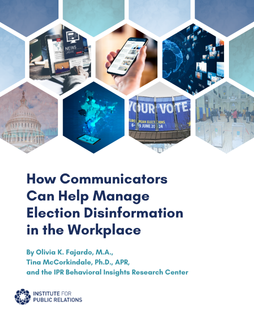[Editor’s Note: In PR education, NYU believes that its Master of Science in Public Relations gives communication professionals an important, differentiating credential in the competitive landscape. NYU’s School of Continuing and Professional Studies, working in conjunction with executives from companies including some represented on the IPR Board of Trustees, has crafted a curriculum that includes a “Capstone course.” It requires students to produce a major paper that contributes to the field of public relations. We invited Elizabeth Ghormley, a recent graduate from NYU’s Master’s program, and her faculty advisor Toni Muzi Falconi, to comment on the subject of Elizabeth’s paper, which is published by the Institute on this website.]
Aneel Karnani’s recent article in the Wall Street Journal questioning the value and validity of Corporate Social Responsibility (CSR) set afire responses from all sectors, cheering and jeering its practical and conceptual realities. [“The Case Against Corporate Social Responsibility” August 23, 2010, www.wsj.com].
Karnani argues companies cannot create value for shareholders by distracting themselves with CSR. Responses generally said CSR is not a distraction but a path to better business that will drive more sound and sustainable creation of value.
Beyond this ‘recurring’ debate, there are indications that much of CSR in the business community is ‘lip service’ and ‘political correctness’. As Harvard Business School’s Robert Eccles (co-author of the recent and recommendable book One Report), conceded in a recent conversation: corporate governance concerns related to basic labor, social and employee practices might not be valued as a primary CSR variable in much of the US management community.
New York Times columnist Bob Herbert recently noted “the treatment of workers by American corporations has been worse – far more treacherous – than most of the population realizes.” In his NYT piece, Herbert explains:
“The recession officially started in December 2007. From the fourth quarter of 2007 to the fourth quarter of 2009, real aggregate output in the U.S., as measured by the gross domestic product, fell by about 2.5 percent. But employers cut their payrolls by 6 percent. …’ They threw out far more workers and hours than they lost output,’ said Professor Sum from Northeastern. ‘Here’s what happened: At the end of the fourth quarter in 2008, you see corporate profits begin to really take off, and they grow by the time you get to the first quarter of 2010 by $572 billion. And over that same time period, wage and salary payments go down by $122 billion.'”
Consider the discrepancy between employee and management compensation.
At Alcoa, the aluminum producer widely regarded for its sustainability work, CEO Klaus Kleinfeld received $11.8 million in total compensation in 2009. By comparison, the average worker made $32,048. At Wal-Mart, whose CSR practices are heralded for hugely reducing plastic packaging and integrating sustainability into the lifestyles of hundreds of thousands of employees, CEO Michael T. Duke received $19.2 million in total compensation compared to the average worker’s $32,048, according to AFL-CIO CEO Pay Database.
How can companies be considered responsible, innovative in the environment or be lauded for its “sustainability” and not pay employees living wages?
Back in 1964, when I was a young Italian media relations practitioner at 3M Company, William McKnight – legendary chairman of possibly the most sustainable corporation over more than 100 years – said to me that if the lowest paid worker’s compensation was more than six (yes, he said six!) times lower than the highest paid manager, that company was inherently rotten.
Governance is inherently called into question here. What role does the structure of a governance body play in widening the gap between the everyman and the boss? What is to be said for requiring that CEOs not fill the role of Chairman of the Board? In 2009, business leaders from Yale came together to call for this separation, noting its influence on market trust.
It is apparent that we can critically evaluate CSR from at least two polarized perspectives: the traditional “Milton Friedman view” echoed by the WSJ column, or the “social-labor slanted” approach represented by the discrepancy between CEO and worker wages.
On the other hand, a paper by Elizabeth Ghormley – a recent graduate from NYU’s Master in Public Relations – seems to suggest that in concept and in practice the root of the CSR lies mostly in stakeholder relationships.
Profiled companies, including Timberland, Brown-Forman, Hess, and others, are finding innovative ways to engage a variety of stakeholders on key issues, use technology to have open discourse and frank dialog, and forge conversations and action on issues where other sectors lag.
The paper also contains an enlightening and direct interview with Dr. Mervyn King, the South African expert on corporate governance, recently elected Chair of the Global Reporting Initiative. Dr. King is leading the way towards integrated reporting from a perspective that clearly endorses the need for public relations to support Boards of Directors in mapping, listening and closely monitoring management in the definition and implementation of stakeholder relationships policies.
The paper is available at here.





When is CSR a manifestation of corporate lip service and political correctness?
Simple. When it is neither aligned with, nor relevant to, the size, scale, nature and culture of a specific business.
Nick Smith, Managing Director, Living Reporting Ltd